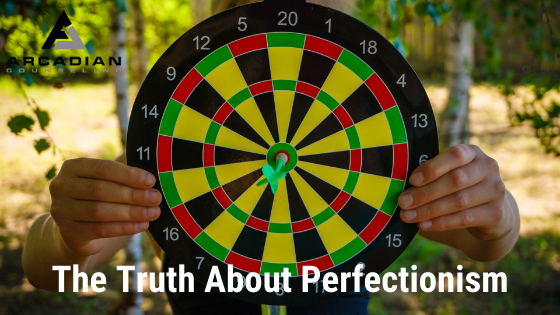We live in a society that seems to value perfectionism and all things that appear perfect. Of course there are things that can actually be perfect. Architects can draw the perfect straight line, mathematicians can solve an equation with a perfect calculation, and a chocolate cake can be perfectly moist. ????
But as human beans, we can never reach a state of perfection because we will always be a work in progress. Perfection indicates a finality – a finished product – but as humans, we are always growing and changing. Or at least we should be!
I once heard someone say, “I’m not trying to be perfect because if I am, then I won’t have anyone to relate to.” Sounds about right to me!
What is perfectionism?

Focusing on completion and progress is a much better strategy than focusing on achieving perfection.
Many people view perfectionism as a positive attribute. They believe the more “perfect” they are, the more success they will have in life. Key word there is “believe.”
Perfectionism is NOT the same thing as always doing or giving your best. Obviously it’s important that we always do our best. Because by doing so, we will experience healthy achievements and growth.
However, people with perfectionistic tendencies often have self-defeating thoughts and/or behaviors that actually make it HARDER to achieve their goals. Perfectionism almost always causes one to feel stress, anxiety, and depression.
Signs to look for in perfectionism

One big sign of perfectionism is constantly catching yourself overthinking. They often go hand in hand.
Most people from time to time, will strive for perfectionism in some or many aspects of their life. This is a natural part of our evolution and growth. As an example, that “perfectly moist chocolate cake” I mentioned earlier got that way because the person who baked it was trying to get everything JUST RIGHT as a gift for someone’s birthday.
But there are those people who are “full-time” perfectionists. They strive for perfection in all aspects of their life.
Here are some signs you may be a perfectionist:
- You don’t like to tackle tasks or activities unless you feel you can complete them perfectly.
- You are end-oriented – meaning you focus a little on the process of creating or learning something and put ALL the emphasis on the outcome.
- You cannot see a task as complete it unless it meets your perfectionistic standards.
- You tend to procrastinate because you don’t like starting a task until you know you can complete it perfectly.
- It takes you much longer to complete tasks than others. This can be problematic at work.
Getting help
Again, perfectionism is not the same thing as doing your best. It is a condition in which the person is almost incapable of feeling a sense of joy or pride at what they accomplish because in their own minds, they are never quite good enough.
Sound awful? That’s because it is. Perfectionists typically complain of a lack of fulfillment and satisfaction in life. They often struggle in relationships, work, and daily functioning.
Life is short, living with perfectionism can feel like an eternity. If you’re struggling with stress and anxiety as a result of perfectionistic tendencies, find an awesome therapist or life coach you like and trust to help you figure out a more satisfying and fulfilling way to live your life.
James Killian, LPC is the Principal Therapist & Owner of Arcadian Counseling in New Haven, CT where they specialize in helping over-thinkers, high achievers, and perfectionists reduce stress, increase fulfillment and enhance performance so they can move From Surviving To Thriving.


